Categories
Archives
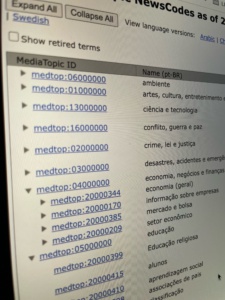
The IPTC NewsCodes Working Group is pleased to present the Q1 2025 release of IPTC NewsCodes.
As usual, most of the updates are in our flagship subject vocabulary, Media Topics.
Media Topic updates
This release adds 8 new concepts, retires 17 concepts, modifies 43 label names and 64 definitions, adds 10 notes (mostly to retired concepts), makes 28 hierarchy moves and modifies 7 wikidata mappings.
The new and modified terms have already been translated into Swedish (lang=se) and Norwegian (lang=no-NB and lang=no-NN)
New concepts (8 terms)
zoning policy, political party, political movement and association, communism, democratic socialism, theocracy, absolute monarchy, ski mountaineering
Note that ski mountaineering (medtop:20001390) has been added to the Media Topics vocabulary because it was added as a new sport for the 2026 Olympics.
Retired concepts (17 terms)
- civil and public service – use government employee (medtop:20000595) instead.
- military equipment – use military weaponry and equipment (medtop:20000602) instead.
- security measures (defence) – use national security (medtop:20000598) instead.
- national security (old) – Use national security (medtop:20000598) instead.
- public finance – Use government budget (medtop:20000607) or government debt (medtop:20000368) instead.
- government department – Use more specific terms or government (medtop:20000593) instead.
- safety of citizens – Use other terms such as public health (medtop:20001358) or emergency response (medtop:20000168) instead.
- interior policy – Use more specific terms instead.
- personal data collection policy – Use data protection policy (medtop:20000627) instead.
- planning inquiries – Use zoning policy (medtop:20001383), environmental policy (medtop:20000423) or other more specific terms instead.
- political crisis – Use more specific terms instead.
- political process – Use government (medtop:20000593) or other more specific terms instead.
- political parties and movements – Use political party (medtop:20001384) or political movement and association (medtop:20001385) instead.
- political development – Use politics (medtop:11000000) instead.
- civilian service – Use medtop:20001277 volunteering instead.
- integration policy – Use immigration policy (medtop:20000634) instead.
- regulatory authority – Use regulation of industry (medtop:20000636) instead.
Modified labels (43 terms)
politics and government, demonstration, government employee, public officials, constitution (law).
national security.military weaponry and equipment, head of state,local authority, minister or secretary (government), regional authority, taxation policy, data protection policy, immigration policy, summit meeting, treaty, foreign aid, international organisation, refugees and internally displaced people, non-governmental organisation (NGO), political prisoners and dissenters, cultural policy, sports policies, political party convention, political committee, head of government, border dispute, financial service, corporate bond, war victims, missing in action, breaking (breakdance), by-election, recall election, coalition building, zoning policy, political party, political movement and association, communism, democratic socialism, theocracy, absolute monarchy, ski mountaineering.
Modified definitions (64 terms)
politics and government, demonstration, computer networking, economic policy, environmental policy, healthcare policy, government, government employee, public officials, constitution (law), national security, armed forces, military weaponry and equipment, executive (government), government budget, head of state, local authority, minister or secretary (government), regional authority, taxation policy, government policy, nationalisation, privatisation, state-owned enterprise, data protection policy, policy towards indigenous people, pension and welfare policy, personal weapon control policy, immigration policy, nuclear policy, regulation of industry, food and drink regulations, international relations, diplomacy, summit meeting, treaty, economic sanction, foreign aid, international organisation, refugees and internally displaced people, non-governmental organisation (NGO), political prisoners and dissenters, lobbying, political system, democracy, dictatorship, cultural policy, sports policies, regional development policy, political party convention, head of government, infrastructure policy, economic development incentive, political leadership, border dispute, education policy, zoning policy, political party, political movement and association, communism, democratic socialism, theocracy, absolute monarchy, ski mountaineering.
Modified notes (10 terms)
safety of citizens, interior policy, personal data collection policy, planning inquiries, political crisis, political process, political parties and movements, political development, civilian service, integration policy.
Modified broader terms (hierarchy moves) (28 terms)
campaign finance, government employee, public officials, military weaponry and equipment, espionage and intelligence, data protection policy, housing and urban planning policy, policy towards indigenous people, pension and welfare policy, personal data collection policy, personal weapon control policy, planning inquiries, lobbying, political parties and movements, political development, political system, integration policy, regional development policy, infrastructure policy, political leadership, zoning policy, political party, political movement and association, communism, democratic socialism, theocracy, absolute monarchy, ski mountaineering.
Modified wikidata mappings: 7
political party, political movement and association, communism, democratic socialism, theocracy, absolute monarchy, ski mountaineering.
See the official Media Topic vocabulary on the IPTC Controlled Vocabulary server, and an easier-to-navigate tree view. An Excel version of IPTC Media Topics is also available.
Non-Media Topic changes
- New term: Software
- New terms: anonymised, recommended anonymisation

The IPTC NewsCodes Working Group is pleased to announce the latest release of the IPTC NewsCodes, our set of controlled vocabularies for the news industry.
Updates this time span many vocabularies, with the biggest updates to Media Topic and Digital Source Type.
Media Topic updates
Most of the recent work has been in the politics branch.
3 new concepts: by-election, recall election, coalition building
2 retired concepts: political campaigns, church elections
4 modified concept names (in English): voting system, referendum, fundamental rights, football (yes we finally refer to the sport as “football” in en-GB and “soccer” in en-US!)
Modified concept definitions: 22 civil rights, election, voting system, intergovernmental elections, local elections, primary elections, referendum, regional elections, voting, fundamental rights, censorship and freedom of speech, freedom of religion, freedom of the press, human rights, football, political debates, privacy, women’s rights, breaking (breakdance)
1 hierarchy move: fundamental rights has been moved from politics to society.
Also, the Wikidata mapping URIs have all been changed to point to the http:// version of the URI instead of the https:// version. This follows the official Wikidata guidance.
See the official Media Topic vocabulary on the IPTC Controlled Vocabulary server, and an easier-to-navigate tree view. An Excel version of IPTC Media Topics is also available.
Digital Source Type updates
5 new concepts have been added:
- Multi-frame computational capture sampled from real life, intended to cover media recorded by modern cameras and smartphones that may process several captured images together to create the saved media file, without any interaction with the photographer.
- Human-edited media, intended to replace the retired Original media with minor human edits, given that it is subjective to decide what is a “minor” edit.
- Digital creation, intended to replace the retired Digital art so that we can avoid the existential question of “what is art?”
- Screen capture, covering screenshots and screen recordings made on a device
- Composite of elements, as a generic form of the more specific “composite” terms.
2 concepts have been retired: Original media with minor human edits, and Digital art, as explained above.
8 concepts have had their names and definitions modified, while retaining the same machine-readable ID for backwards-compatibility purposes:
- Digital capture sampled from real life (ID: digitalCapture), replacing the previous name “Original digital capture sampled from real life”
- Digitised from a transparent negative (ID: negativeFilm), replacing the previous name “Digitised from a negative on film”
- Digitised from a transparent positive (ID: positiveFilm), replacing the previous name “Digitised from a positive on film”
- Digitised from a non-transparent medium (ID: print), replacing the previous name “Digitised from a print on non-transparent medium”
- Edited using Generative AI (ID: compositeWithTrainedAlgorithmicMedia), replacing the previous name “Composite with Trained algorithmic media”
- Algorithmically-altered media (ID: algorithmicallyEnhanced), replacing the previous name “Algorithmically Enhanced”
- Created using Generative AI (ID: trainedAlgorithmicMedia), replacing the previous name “Trained Algorithmic Media”
- Virtual event recording (ID: virtualRecording), replacing the previous name “Virtual recording”
Our thanks go to IPTC representatives and experts from Partnership on AI, Google, Adobe, C2PA, CIPA and many others on making these updates to our vocabulary, which is now widely used to identify Generative AI content.
Updates to other NewsCodes vocabularies
Alternative Identifier Role (altidrole)
- Vocabulary’s name changed to fix a spelling mistake.
- New concept: IPTC Video Metadata Hub ID (altidrole:vmhVideoId)
Event Occur Status (eocstat)
- Fix spelling mistake “occurence” -> “occurrence” throughout.
Golf Shot (spgolshot)
- New concept: Chip (spgolshot:chip)
Rights Property (rightsprop)
- New concept: Copyright Year (rightsprop:copyrightyear)
- 4 modified definitions: Minor Model Age Disclosure, Model Release Id, Model Release Status, Property Release Status.
Sports Concept (spct)
- New concept: Recurring Competition (spct:recurring-competition)
- New concept: Governing Body (spct:governing-body)
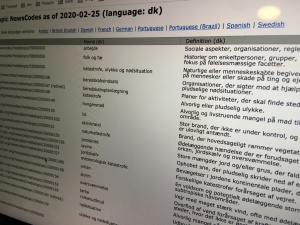 The IPTC NewsCodes Working Group has released the latest update to IPTC NewsCodes vocabularies.
The IPTC NewsCodes Working Group has released the latest update to IPTC NewsCodes vocabularies.
The changes are quite minor this time, but we still recommend that users stay up to date with the latest version.
Changes to Media Topics vocabulary
Our main subject classification taxonomy, IPTC Media Topics, has seen the following updates:
1 new concept
- breaking (breakdance) (added earlier this year in time for the Paris 2024 Olympics)
1 retired concept
- missing in action (duplicate term added in error in the 2024 Q1 update. The existing term missing in action medtop:20000061 was moved to replace the newer term))
32 modified definitions
These changes mostly correct spelling errors in en-GB where US spellings had slipped in, such as changing “behavior” to “behaviour” for en-GB:
wireless technology, tobacco and nicotine, economic trends and indicators, international economic institution, stocks and securities, adult and continuing education, upper secondary education, social learning, medical condition, Confucianism, relations between religion and government, road cycling, competitive dancing, sexual misconduct, developmental disorder, fraternal and community group, cyber warfare, public transport, taxi and ride-hailing, shared transport, business reporting and performance, business restructuring, commercial real estate, residential real estate, podcast, financial service, business service, news industry, diversity, equity and inclusion, sustainability, profit sharing, breaking (breakdance).
As usual, the Media Topics vocabularies can be viewed in the following ways:
- In a collapsible tree view
- As a downloadable Excel spreadsheet
- On one page on the cv.iptc.org server
- In machine readable formats such as RDF/XML and Turtle using the SKOS vocabulary format: see the cv.iptc.org guidelines document for more detail.
Updates to other vocabularies
Horse Position (sphorposition)
New term “trainer” added to https://cv.iptc.org/newscodes/sphorposition. This term is needed by IPTC Sport Schema.
For more information on IPTC NewsCodes in general, please see the IPTC NewsCodes Guidelines.
The latest update to IPTC NewsCodes, the 2024-Q1 release, was published on Thursday 28th March.
This release includes many updates to our Media Topic subject vocabulary, plus changes to Content Production Party Role, Horse Position, Tournament Phase, Soccer Position, Genre, User Action Type and Why Present.
UPDATE on 11 April: we released a small update to the Media Topics, including Norwegian (no-NB and no-NN) translations of the newly added terms, thanks to Norwegian news agency NTB.
We also made one label change in German: medtop:20000257 from “Alternative-Energie” to “Erneuerbare Energie,” This change was made at the request of German news agency dpa.
Changes to Media Topics vocabulary
As part of the regular review undertaken by the NewsCodes Working Group, many changes were made to the economy, business and finance branch of Media Topics. In addition, a number of changes were made to the conflict, war and peace branch in response to suggestions made by new IPTC member ABC Australia.
5 new concepts: sustainability, profit sharing, corporate bond, war victims, missing in action.
12 retired concepts: justice, restructuring and recapitalisation, bonds, budgets and budgeting, consumers, consumer issue, credit and debt, economic indicator, government aid, investments, prices, soft commodities market.
55 modified concepts: peacekeeping force, genocide, disarmament, prisoners of war, war crime, judge, economy, economic trends and indicators, business enterprise, central bank, consumer confidence, currency, deflation, economic growth, gross domestic product, industrial production, inventories, productivity, economic organisation, emerging market, employment statistics, exporting, government debt, importing, inflation, interest rates, international economic institution, international trade, trade agreements, balance of trade, trade dispute, trade policy, monetary policy, mortgages, mutual funds, recession, tariff, market and exchange, commodities market, energy market, debt market, foreign exchange market, loan market, loans and lending, study of law, disabilities, mountaineering, sport shooting, sport organisation, recreational hiking and climbing, start-up and entrepreneurial business, sharing economy, small and medium enterprise, sports officiating, bmx freestyle.
48 concepts with modified names/labels: judge, emergency incident, transport incident, air and space incident, maritime incident, railway incident, road incident, restructuring and recapitalisation, economic trends and indicators, exporting, importing, interest rates, balance of trade, mortgages, commodities market, soft commodities market, loans and lending, study of law, disabilities, mountain climbing, mountaineering, sport shooting, sport organisation, recreational hiking and climbing, start-up and entrepreneurial business, sports officiating, bmx freestyle, tsunami, healthcare industry, developmental disorder, depression, anxiety and stress, public health, pregnancy and childbirth, fraternal and community group, cyber warfare, public transport, taxi and ride-hailing, shared transport, business reporting and performance business restructuring commercial real estate residential real estate podcast, financial service, business service, news industry, diversity, equity and inclusion.
57 modified definitions: war crime, economy, economic trends and indicators, business enterprise, central bank, consumer confidence, currency, deflation, economic growth, economic organisation, emerging market, employment statistics, exporting, government debt, importing, inflation, interest rates, international economic institution, trade agreements, trade dispute, trade policy, mortgages, recession, tariff, market and exchange, commodities market, energy market, soft commodities market, debt market, foreign exchange market, loan market, loans and lending, disabilities, mountaineering, sport organisation, start-up and entrepreneurial business, sharing economy, small and medium enterprise, tsunami, healthcare industry, developmental disorder, depression, anxiety and stress, public health, pregnancy and childbirth, cyber warfare, public transport, taxi and ride-hailing, shared transport, business reporting and performance, business restructuring, commercial real estate, residential real estate, podcast, financial service, business service, news industry.
22 modified broader terms (hierarchy moves): peacekeeping force, genocide, disarmament, prisoners of war, business enterprise, central bank, consumer confidence, currency, gross domestic product, industrial production, inventories, productivity, economic organisation, emerging market, interest rates, international economic institution, international trade, monetary policy, mutual funds, tariff, loans and lending, bmx freestyle.
These changes are already available in the en-GB, en-US and Swedish (se) language variants. Thanks go to TT and Bonnier News for their work on the Swedish translation.
If you would like to contribute or update a translation to your language, please contact us.
Sports-related NewsCodes updates
We also made some changes to our sports NewsCodes vocabularies, which are mostly used by SportsML and IPTC Sport Schema.
New vocabulary: Horse Position
New entries in Tournament Phase vocabulary: Heat, Round of 16
New entry in Soccer Position: manager,
News-related NewsCodes updates
Content Production Party Role: new term Generative AI Prompt Writer which can also be used in Photo Metadata Contributor to declare who wrote the prompt that was used to generate an image.
Genre: new term User-Generated Content.
Why Present: new term associated.
The User Action Type vocabulary, mostly used by NewsML-G2, has had some major changes.
Previously this vocabulary defined terms related to specific social media services or interactions. We have retired/deprecated all site-specific terms (Facebook Likes, Google’s +1, Twitter re-tweets, Twitter tweets).
Instead, we have defined some generic terms: Like, Share, Comment. The pageviews term has been broadened into simply views (although the ID remains as “pageviews” for backwards-compatibility)
Thanks to the NewsCodes Working Group for their work on this release, and to all members and non-members who have suggested changes.
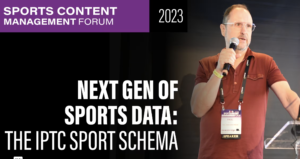
As we wrap up 2023, we thought it would be useful to give an update you on the IPTC’s work in 2023, including updates to most of our standards.
Two successful member meetings, one in person!
This year we finally held our first IPTC Member meeting in person since 2019, in Tallinn Estonia. We had around 30 people attend in person and 50 attended online from over 40 organisations. Presentations and discussions ranged from the e-Estonia digital citizen experience to building re-usable news content widgets with Web Components, and of course included generative AI, credibility and fact checking, and more. Here’s our report on the IPTC 2023 Spring Meeting.
For our Autumn Meeting we went back to an online format, with over 50 attendees, and more watching the recordings afterwards (which are available to all members). Along with discussions of generative AI and content licensing at this year’s meetings, it was great to hear the real-world implementation experience of the ASBU Cloud project from the Arab States Broadcasting Union. The system was created by IPTC members Broadcast Solutions, based on NewsML-G2. The DPP Live Production Exchange, led by new members Arqiva, will be another real-world implementation coming soon. We heard about the project’s first steps at the Autumn Meeting.
Also at this years Autumn Meeting we also heard from Will Kreth of the HAND Identity platform and saw a demo of IPTC Sport Schema from IPTC member Progress Software (previously MarkLogic). More on IPTC Sport Schema below! All news from the Autumn Meeting is summed up in our post AI, Video in the cloud, new standards and more: IPTC Autumn Meeting 2023
We’re very happy to say that the IPTC Spring Meeting 2024 will be held in New York from April 15 – 17. All IPTC member delegates are welcome to attend the meeting at no cost. If you are not a member but would like to present your work at the meeting, please get in touch using our Contact Us form.
IPTC Photo Metadata Conference, 7 May 2024: save the date!
Due to several issues, we were not able to run a Photo Metadata Conference in 2023, but we will be back with an online Photo Metadata Conference on 7th May 2024. Please mark the date in your calendar!
As usual, the event will be free and open for anyone to attend.
If you would like to present to the people most interested in photo metadata from around the world, please let us know!
Presentations at other conferences and work with other organisations
IPTC was represented at the CEPIC Congress in France, the EBU DataTech Seminar in Geneva, Sports Video Group Content Management Forum in New York and the DMLA’s International Digital Media Licensing Conference in San Francisco.
We also worked with CIPA, the organisation behind the Exif photo metadata standard, on aligning Exif with IPTC Photo Metadata, and supported them in their work towards Exif 3.0 which was announced in June.
The IPTC will be advising the TEMS project which is an EU-funded initiative to build a “media data space” for Europe, and possibly beyond: IPTC working with alliance to build a European Media Data Space.
IPTC’s work on Generative AI and media
Of course the big topic for media in 2023 has been Generative AI. We have been looking at this topic for several years, since it was known as “synthetic media” and back in 2022 we created a taxonomy of “digital source types” that can be used to describe various forms of machine-generated and machine-assisted content creation. This was a joint effort across our NewsCodes, Video Metadata and Photo Metadata Working Groups.

It turns out that this was very useful, and the IPTC Digital Source Type taxonomy has been adopted by Google, Midjourney, C2PA and others as a way to describe content. Here are some of our news posts from 2023 on this topic:
- IPTC publishes metadata guidance for AI-generated “synthetic media”
- Google announces use of IPTC metadata for generative AI images
- Midjourney and Shutterstock AI sign up to use of IPTC Digital Source Type to signal generated AI content
- Microsoft announces signalling of generative AI content using IPTC and C2PA metadata
- Royal Society/BBC workshop on Generative AI and content provenance
- New “digital source type” term added to support inpainting and outpainting in Generative AI
- IPTC releases technical guidance for creating and editing metadata, including DigitalSourceType
IPTC’s work on Trust and Credibility
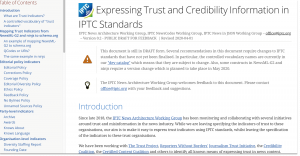
After a lot of drafting work over several years, we released the Guidelines for Expressing Trust and Credibility signals in IPTC standards that shows how to embed trust infiormation in the form of “trust indicators” such as those from The Trust Project into content marked up using IPTC standards such as NewsML-G2 and ninjs. The guideline also discusses how media can be signed using C2PA specification.
We continue to work with C2PA on the underlying specification allowing signed metadata to be added to media content so that it becomes “tamper-evident”. However C2PA specification in its current form does not prescribe where the certificates used for signing should come from. To that end, we have been working with Microsoft, BBC, CBC / Radio Canada and The New York Times on the Steering Committee of Project Origin to create a trust ecosystem for the media industry. Stay tuned for more developments from Project Origin during 2024.
IPTC’s newest standard: IPTC Sport Schema
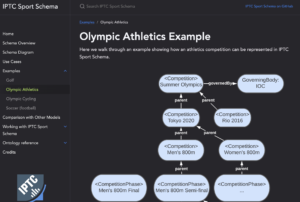
After years of work, the IPTC Sports Content Working Group released version 1.0 of IPTC Sport Schema. IPTC Sport Schema takes the experience of IPTC’s 10+ years of maintaining the XML-based SportsML standard and applies it to the world of the semantic web, knowledge graphs and linked data.
Paul Kelly, Lead of the IPTC Sports Content Working Group, presented IPTC Sport Schema to the world’s top sports media technologists: IPTC Sport Schema launched at Sports Video Group Content Management Forum.
Take a look at out dedicated site https://sportschema.org/ to see how it works, look at some demonstration data and try out a query engine to explore the data.
If you’re interested in using IPTC Sport Schema as the basis for sports data at your organisation, please let us know. We would be very happy to help you to get started.
Standard and Working Group updates
- Our IPTC NewsCodes vocabularies had two big updates, the NewsCodes 2023-Q1 update and the NewsCodes Q3 2023 update. For our main subject taxonomy Media Topics, over the year we added 12 new concepts, retired 73 under-used terms, and modified 158 terms to make their labels and/or descriptions easier to understand. We also added or updated vocabularies such as Digital Source Type and Authority Status.
- The News in JSON Working Group released ninjs 2.1 and ninjs 1.5 in parallel, so that people who cannot move from the 1.x schema can still get the benefits of new additions. The group is currently working on adding events and planning items to ninjs based on requirements the DPP Live Production Exchange project: expect to see something released in 2024.
- NewsML-G2 2.32 and NewsML-G2 v2.33 were released this year, including support for Generative AI via the Digital Source Type vocabulary.
- The IPTC Photo Metadata Standard 2023.1 allows rightsholders to express whether or not they are willing to allow their content to be indexed by search engines and data mining crawlers, and whether the content can be used as training data for Generative AI. This work was done in partnership with the PLUS Coalition. We also updated the IPTC Photo Metadata Mapping Guidelines to accommodate Exif 3.0.
- Through discussions and workshops at our Member Meetings in 2022 and 2023, we have been working on making RightsML easier to use and easier to understand. Stay tuned for more news on RightsML in 2024.
- Video Metadata Hub 1.5 adds the same properties to allow content to be excluded from generative AI training data sets. We have also updated the Video Metadata Hub Generator tool to generate C2PA-compliant metadata “assertions”.
New faces at IPTC
Ian Young of Alamy / PA Media Group stepped up to become the lead of the News in JSON Working Group, taking over from Johan Lindgren of TT who is winding down his duties but still contributes to the group.
We welcomed Bonnier News, Newsbridge, Arqiva, the Australian Broadcasting Corporation and Neuwo.ai as new IPTC members, plus a very well known name who will be joining at the start of 2024. We’re very happy to have you all as members!
We are always happy to work with more organisations in the media and related industries. If you would like to talk to us about joining IPTC, please complete our membership enquiry form.
Here’s to a great 2024!
Thanks to everyone who gave IPTC your support, and we look forward to working with you in the coming year.
If you have any questions or comments (and especially if you would like to speak at one of our events in 2024!), you can contact us via our contact form.
Best wishes,
Brendan Quinn
Managing Director, IPTC
and the IPTC Board of Directors: Dave Compton (LSE Group), Heather Edwards (The Associated Press), Paul Harman (Bloomberg LP), Gerald Innerwinkler (APA), Philippe Mougin (Agence France-Presse), Jennifer Parrucci (The New York Times), Robert Schmidt-Nia of DATAGROUP (Chair of the Board), Guowei Wu (Xinhua)
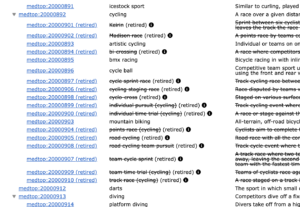
The IPTC News Codes Working Group has just released a new batch of changes to the IPTC NewsCodes family of controlled vocabularies.
Note that we skipped the Q2 update this year because there weren’t many changes, and also because there were already so many changes in Q1 of this year.
Media Topic changes
Here’s a summary of changes to Media Topic vocabulary:
- 2 new concepts: sustainability, profit sharing
- 3 retired concepts: justice, restructuring and recapitalisation, soft commodity
- 7 modified names (labels): restructuring and recapitalisation, soft commodity, study of law, sport shooting, sport organisation, recreational hiking and climbing, mountaineering, disabilities (German and Norwegian translations)
- 2 modified definitions: mountaineering, sport organisation
Change to Media Topic tree browser
We have made a small change to the Media Topic tree browser tool: we now display a small “i” icon next to the label name for terms that have notes defined.
The terms that have notes are usually retired terms, and the note gives the user information regarding which terms should be used instead of the retired term. But in other cases notes are used to help explain changes or clarify usage.
Changes to other vocabularies
Other vocabularies have also been updated:
- Content Production Party Role sees two new terms, contentEditor and metadataEditor, that can be used to show changes made by humans or systems (such as AI engines)
- Format had a small change to indicate that it is not just for NewsML 1 documents.
- User Action Type had a small bug fix, changed references to Twitter / X and retired Google Plus as a term. More changes will be coming soon covering other social media platforms and ways to track user interactions with media content.
- The rendition CV has been updated to make it more generic – renditions can apply to any type of media, not just images and video.
- The digitalsourcetype CV had already been updated in July to handle inpainting and outpainting but we mention it again here as a reminder.
Thanks to the representatives from IPTC members AFP, NTB, Bonnier News, ABC Australia, Bloomberg, New York Times and Associated Press for their contributions to the changes this quarter via the NewsCodes Working Group.
We are still working on our regular review of Media Topics – currently we are in the middle of a review of the Economy branch. The review is not yet complete but we hope for it to be ready for the Q4 or Q1 update.
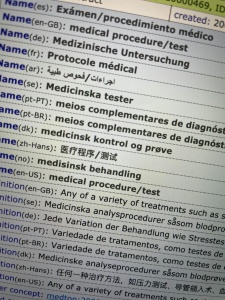 Today, IPTC announces the biggest change to the NewsCodes vocabularies in years. Almost 200 terms have been modified in the Media Topics vocabulary, including many “retirements”, trimming the CV down to exactly 1100 terms.
Today, IPTC announces the biggest change to the NewsCodes vocabularies in years. Almost 200 terms have been modified in the Media Topics vocabulary, including many “retirements”, trimming the CV down to exactly 1100 terms.
Overall, three controlled vocabularies have been updated: Content Warning, Content Production Party Role and Media Topic.
The changes to Media Topic CV are the biggest ever, with 9 new concepts, 60 retired concepts and 120 modified concepts, including 79 hierarchy moves.
The NewsCodes Working Group has been working hard on this update for over six months, bringing much-needed clarity to the “economy, business and finance” branch.
As part of the review, the “economic sector” sub-branch has been re-named “products and services”, handle both the companies making products or providing services, and also the products and services themselves.
Specifically, we have changed the following:
- 9 New concepts: business reporting and performance, business restructuring, commercial real estate, residential real estate, podcast, financial service, business service, news industry and diversity, equity and inclusion.
- 60 retired concepts: business finance, accounting and audit, analysts comment, earnings forecast, stock option, licensing agreement, aquaculture, arable farming, livestock farming, viniculture, fertiliser, health and beauty product, inorganic chemical, organic chemical, computer networking, computer security, telecommunication equipment, design and engineering, house building, land price, real estate, beverage, grocery, mail order, non-durable good, kerosene/paraffin, financial and business service, funeral parlour and crematorium, janitorial service, personal finance, personal income, personal service, printing service, wedding service, industrial component, instrument engineering, news agency, newspaper and magazine, online media industry, iron and steel, mining, non-ferrous metal, process industry, distiller and brewer, paper and packaging product, rubber product, soft drinks, textile and clothing, traffic, securities, renewable energy, stock recommendation, buy recommendation, hold recommendation, sell recommendation, hot stock, Internet of Things, capital goods, e-cigarette and commercial building. Most of these have notes attached describing which terms should be used instead of the retired ones.
- 39 name (label) changes: terrorist bombings, stock buyback corporate dividends corporate earnings, business financing, shareholder activity, executive officer, business strategy and marketing, products and services, commercial fishing, plastic, computer and telecommunications hardware, semiconductor and electronic component, software and applications, restoration, online shopping, toy and game, renewable energy, electricity, waste management, auction, consultancy, financial advisory service, personal finance and investment, shipping and postal service, media and entertainment industry, books and publishing, film industry, metal and mineral mining and refining, precious material, beverage and grocery, tobacco and nicotine, casinos and gambling, derivatives, stocks and securities, handicrafts, oil and gas, sales channel and heating and cooling.
- 81 definition changes: cyber crime, war crime, bankruptcy, stock buyback, corporate dividends, corporate earnings, business financing, shareholder activity, stock option, business governance, new product or service, patent, copyright and trademark, products and services, agriculture, commercial fishing, forestry and timber, pharmaceutical, plastic, computing and information technology, computer and telecommunications hardware, semiconductor and electronic component, software and applications, telecommunication service, wireless technology, restoration, clothing, online shopping, luxury good, retail, toy and game, energy and resource, renewable energy, diesel fuel, electricity, natural gas, waste management, water supply, accountancy and auditing, auction, banking, market research, personal finance and investment, rental service, shipping and postal service, defence equipment, heavy engineering, machine manufacturing, shipbuilding, media and entertainment industry, advertising, books and publishing, film industry, music industry, public relations, radio industry, television industry, metal and mineral mining and refining, building material, precious material, beverage and grocery, tobacco and nicotine, tourism and leisure industry, casinos and gambling, hotel and accommodation, restaurant and catering, tour operator, transport, air transport, railway transport, road transport, derivatives, stocks and securities, handicrafts, asset management, railway manufacturing, medical equipment, pet product and service, biofuel, utilities, streaming service and crowdfunding.
Currently, the name and description changes have only been made in English (both en-GB and en-US variants). Other language versions will come soon when their maintainers can make the appropriate changes to their translations.
Changes to Content Warning CV
New terms Drug Use, Fantasy Violence, Flashing Lights, Personally Identifiable Information to match standard terms used in the industry. The “Flashing Lights” term is intended to be used for flagging content that may trigger photosensitive epilepsy, a key accessibility concern by many broadcasters and a legal requirement in some countries.
Label change: Suffering to Upsetting and Disturbing to match industry usage.
Changes to Content Production Party Role CV
New term Distributor. Changed definition of Information Originator.
More information on IPTC Controlled Vocabularies
As always, the Media Topics vocabularies can be viewed in the following ways:
- In a collapsible tree view
- As a downloadable Excel spreadsheet
- On one page on the cv.iptc.org server
- In machine readable formats such as RDF/XML and Turtle using the SKOS vocabulary format. See the cv.iptc.org guidelines document for more detail.
For more information on IPTC NewsCodes in general, please see the IPTC NewsCodes Guidelines.

Here is a wrap-up of IPTC has been up to in 2022, covering our latest work, including updates to most of our key standards.
Two successful member meetings and five member webinars
This year we again held our member meetings online, in May and October. We had over 70 registered attendees each time, from over 40 organisations, which is well over half of our member organisations so it shows that the virtual format works well.
This year we had guests from United Robots, Kairntech, EDRLab, Axate, HAND Identity, RealityDefender.ai, synthetic media consultant Henrik de Gyor and metaverse expert Toby Allen, as well as member presentations from The New York Times, Agence France-Presse, Refinitiv (an LSE Group company), DATAGROUP Consulting, TT Sweden, iMatrics and more. And that’s not even counting our regular Working Group presentations! So we had a very busy three days in May and October.
We also had some very interesting members-only webinars including a deep dive into ninjs 2.0, JournalList and the trust.txt protocol, a joint webinar with the EBU on how Wikidata and IPTC Media Topics can be used together, and a great behind the scenes question-and-answer session with a product manager from Wikidata itself.
Recordings of all presentations and webinars are available to IPTC members in the Members-Only Zone.
A fascinating Photo Metadata Conference
This year’s IPTC Photo Metadata Conference was held online in November and we had over 150 registrants and 19 speakers from Microsoft, CBC Radio Canada, BBC, Adobe, Content Authenticity Initiative, the Smithsonian and more. The general theme was bringing the IPTC Photo Metadata Standard to the real world, focussing on adoption of the recently-introduced accessibility properties, looking at adoption and interoperability between different software tools, including a new comparison tool that we have introduced; use of C2PA and Content Authenticity in newsroom workflows, with demos from the BBC and CBC (with Microsoft Azure).
We also had an interesting session discussing the future of AI-generated images and how metadata could help to identify which images are synthetic, the directions and algorithms used to create them, and whether or not the models were trained on copyrighted images.
Recordings of all sessions are available online.
Presentations at other conferences, work with other organisations
IPTC was represented at the CEPIC Congress in Spain, the DigiTIPS conference run by imaging.org, the Sports Video Group’s content management group, and several Project Origin events.
Our work with C2PA is progressing well. As of version 1.2 of the C2PA Specification, assertions can now include any property from IPTC Photo Metadata Standard and/or IPTC Video Metadata Hub. C2PA support is growing in tools and is now available in Adobe Photoshop.
IPTC is also working with Project Origin on enabling C2PA in the news industry.
We had an IPTC member meet-up at the NAB Show in Las Vegas in May.
We also meet regularly with Google, schema.org, CIPA (the camera-makers behind the Exif standard), ISO, CEPIC and more.
Standard and Working Group updates
- Our IPTC NewsCodes vocabularies had regular updates each quarter, including 12 new terms at least 20 retired terms. See the details in our news posts about the September Update, July Update, May Update, and the February Update (in time for the Winter Olympics). We also extended the Digital Source Type vocabulary specifically to address “synthetic media” or AI-generated content.
- The News in JSON Working Group released ninjs 1.4, a parallel release for those who can’t upgrade to ninjs 2.0 which was released in 2021. We published a case study showing how Alamy uses ninjs 2.0 for its content API.
- NewsML-G2 v2.31 includes support for financial instruments without the need to attach them to organisations.
- Photo Metadata Standard 2022.1 includes a Contributor structure aligned with Video Metadata Hub which can handle people who worked on a photograph but did not press the shutter, such as make-up artists, stylists or set designers;
- The Sports Content Working Group is working on the IPTC Sport Schema, which is pre-release but we are showing it to various stakeholders before a wider release for feedback. If you are interested, please let me know!
- Video Metadata Hub 1.4 includes new properties for accessibility, content warnings, AI-generated content, and clarifies the meanings of many other properties.
New faces at IPTC
We waved farewell to Johan Lindgren of TT as a Board Member, after five years of service. Thankfully Johan is staying on as Lead of the News in JSON Working Group.
We welcomed long-time member Heather Edwards of The Associated Press as our newest board member.
We welcomed Activo, Data Language, Denise Kremer, MarkLogic, Truefy, Broadcast Solutions and Access Intelligence as new IPTC members, plus Swedish publisher Bonnier News who are joining at the start of 2023. We’re very happy to have you all as members!
If you are interested in joining, please fill out our membership enquiry form.
Web site updates
We launched a new, comprehensive navigation bar on this website, making it easier to find our most important content.
We have also just launched a new section highlighting the “themes” that IPTC is watching across all of our Working Groups:
We would love to hear what you think about the new sections, which hopefully bring the site to life.
Best wishes to all for a successful 2023!
Thanks to everyone who has supported IPTC this year, whether as members, speakers at our events, contributors to our standards development or software vendors implementing our standards. Thanks for all your support, and we look forward to working with you more in the coming year.
If you have any questions or comments, you can contact me directly at mdirector@iptc.org.
Best wishes,
Brendan Quinn
Managing Director, IPTC

As is now traditional, the IPTC NewsCodes Working Group has released our regular update at the end of the calendar quarter.
This release includes updates to the Media Topic and Item Relation CVs.
Changes to the Media Topic vocabulary
Label and/or definition changes:
- medtop:20001304 sports award -> sports honour (definition also changed)
- medtop:20001303 sports medal -> sports medal and trophy (definition also changed)
- medtop:20001302 sports record (definition changed)
- medtop:20001104 drug use in sport (definition changed)
Retired terms:
- medtop:20001105 drug abuse in sport: RETIRED
- medtop:20001106 drug testing in sport: RETIRED
- medtop:20001107 medical drug use in sport: RETIRED
Hierarchy moves:
- medtop:20001338 education policy: moved from medtop:05000000 education to medtop:20000621 government policy. This change was suggested by ABC Australia – thanks very much!
New terms:
- medtop:20001360 fraternal and community group (child of medtop:20000768 communities)
- medtop:20001361 cyber warfare (child of medtop:16000000 conflict, war and peace)
- medtop:20001362 public transport (child of medtop:20000337 transport) – suggested by NTB Norway
- medtop:20001363 taxi and ride-hailing (child of medtop:20000337 transport)
- medtop:20001364 shared transport (child of medtop:20000337 transport)
The release also includes no-NN (New Norwegian) translations for the updates released in Q2 2022. Other languages were already updated over previous months.
Changes to other Controlled Vocabularies
The itemrelation CV is used in NewsML-G2 to show types of links between news items. The vocabulary now has two new terms:
- irel:translatedFromRoot: “The related resource contains the content from which this item was translated, either directly or indirectly via one or more other translations”
- irel:wasPackagedIn: “Indicates that this Item was included in the target package”
Thanks to everyone from IPTC members and users of the NewsCodes CV for suggesting terms, and to the NewsCodes and Sports Content Working Groups who helped to put this release together.

Following on with our quarterly update cycle, the IPTC NewsCodes Working Group has released the Q2 2022 update of IPTC NewsCodes, including updates to the Media Topic, Subject Code, and Digital Source Type vocabularies.
Media Topic updates
- Translation changes:
- A new language translation for “New Norwegian” (Norwegian nynorsk, no-NN) has been added to all labels. The existing Norwegian labels previously tagged with “no” are now tagged as “no-NB” for Norwegian bokmål. Thanks very much to NTB for providing the update.
- Label and definition changes:
- medtop:20000446 diseases and conditions
- medtop:20001230 corporate social responsibility -> environmental, social and governance policy (ESG)
- medtop:20000449 epidemic -> epidemic and pandemic
- medtop:20000451 virus disease -> viral disease
- medtop:20000452 AIDS -> HIV and AIDS
- medtop:20000457 medical conditions -> medical condition
- medtop:20000458 mental health and disorder
- medtop:20000463 health organisation
- medtop:20000464 health treatment -> health treatment and procedure
- medtop:20000466 dietary supplement
- medtop:20000467 medical drugs -> non-prescription drug
- medtop:20000468 prescription drugs -> prescription drug
- medtop:20000469 medical procedure/test -> medical test
- medtop:20000470 medicine -> health care approach
- medtop:20000474 western medicine -> conventional medicine
- medtop:20000480 government health care
- medtop:20001225 ophthalmology -> eye care
- Definition changes:
- medtop:07000000 health
- medtop:20000784 family planning
- medtop:20000454 heart disease
- medtop:20000456 injury
- medtop:20000461 health facility
- medtop:20000465 diet
- medtop:20001219 drug rehabilitation
- medtop:20001221 emergency care
- medtop:20000471 herbal medicine
- medtop:20000472 holistic medicine
- medtop:20000473 traditional Chinese medicine
- medtop:20000479 healthcare policy
- medtop:20000483 health insurance
- medtop:20000484 private health care
- medtop:20000486 medical service
- medtop:20000490 paediatrics
- Hierarchy moves:
- medtop:20000500 animal moves to become a child of medtop:20000441 nature
- medtop:20000507 flowers and plants moves to become a child of medtop:20000441 nature
- medtop:20001318 pests moves to become a child of medtop:20000500 animal
- medtop:20000494 animal disease moves to become a child of medtop:20000500 animal
- medtop:20000495 plant disease moves to become a child of medtop:20000507 flowers and plants
- medtop:20000460 obesity becomes a child of medtop:20000457 medical condition
- medtop:20000477 vaccine becomes a child of medtop:20000464 health treatment and procedure
- New terms:
- medtop:20001355 developmental disorder
- medtop:20001356 depression
- medtop:20001357 anxiety and stress
- medtop:20001358 public health
- medtop:20001359 pregnancy and childbirth
- Retired terms:
- medtop:20001218 pandemic (use the new “epidemic and pandemic” term instead)
- medtop:20000450 plague (disease)
- medtop:20000453 retrovirus
- medtop:20000455 illness
- medtop:20000475 physical fitness
- medtop:20000476 preventative medicine
- medtop:20001220 general practice
- medtop:20000488 geriatric medicine
- medtop:20000489 obstetrics/gynaecology
- medtop:20001223 oncology
- medtop:20001222 orthopaedics
- medtop:20000713 pharmacology
- medtop:20001227 psychiatry
- medtop:20001224 radiology
- medtop:20000491 reproductive medicine
- medtop:20001226 surgical medicine
- medtop:20000493 non-human diseases
In a related tool update announcement, we have now added a handy “show retired terms” checkbox to the Media Topics interactive tree browser tool, and we default to only showing the active (non-retired) terms. The new option can be seen in the picture at the top of this article.
Digital Source Type vocabulary updates
After asking for feedback on a draft of the work a few months ago, we have updated the Digital Source Type vocabulary to support the emerging area of “Synthetic Media.”
The single term “softwareImage” has been retired, which means that while it is acceptable in legacy content, we no longer recommend its use. The term is now replaced with 9 new terms covering the spectrum from purely human creation through to purely machine image creation:
- Original media with minor human edits
- Composite of captured elements
- Algorithmically-enhanced media
- Data-driven media
- Digital art
- Virtual recording
- Composite including synthetic elements
- Trained algorithmic media
- Pure algorithmic media
- RETIRED: Created by software
To see more detail including the definition of each term, click the links above or view the entire IPTC Digital Source Type vocabulary.
Thanks to those both inside and outside of the IPTC community who gave feedback on our original proposal, your comments were very much appreciated.
Subject Code vocabulary updates – indicating its deprecated status
The IPTC Subject Code vocabulary was created over twenty years ago, in the year 2000. It was maintained through to 2010, but at that point the Media Topic vocabulary took over as IPTC’s preferred subject classification taxonomy. We will keep it on our vocabulary server, but we no longer recommend its use in projects due to some terms being out of date.
So we have put warnings on the pages of the Subject Code vocabulary that indicate its deprecated nature, and encourage users to look at Media Topic instead.
As always, the Media Topics vocabularies can be viewed in the following ways:
- In a collapsible tree view
- As a downloadable Excel spreadsheet
- On one page on the cv.iptc.org server
- In machine readable formats such as RDF/XML and Turtle using the SKOS vocabulary format: see the cv.iptc.org guidelines document for more detail.
For more information on IPTC NewsCodes in general, please see the IPTC NewsCodes Guidelines.